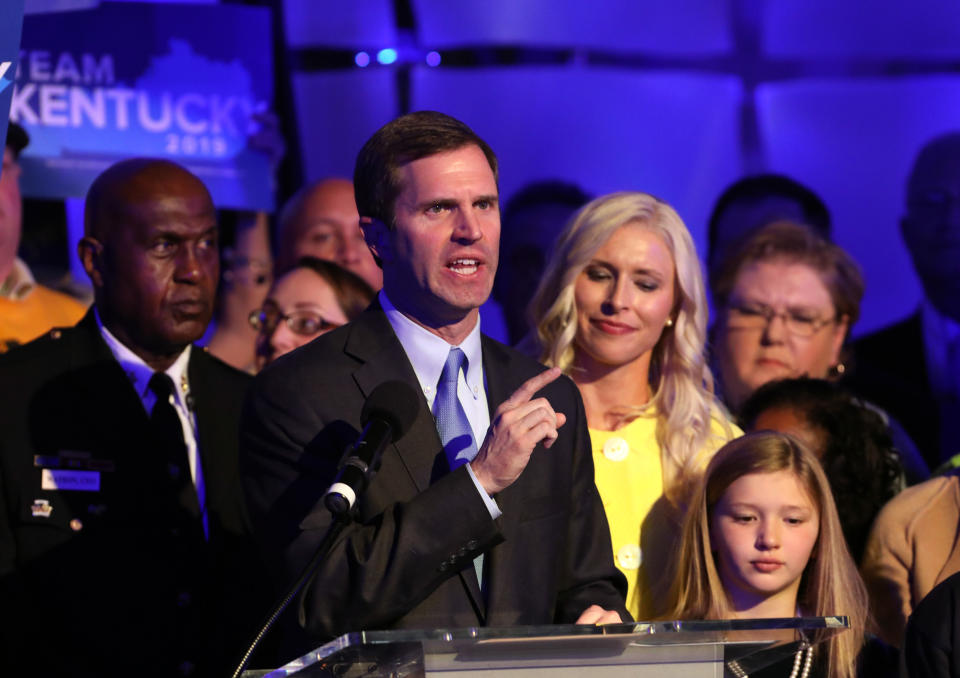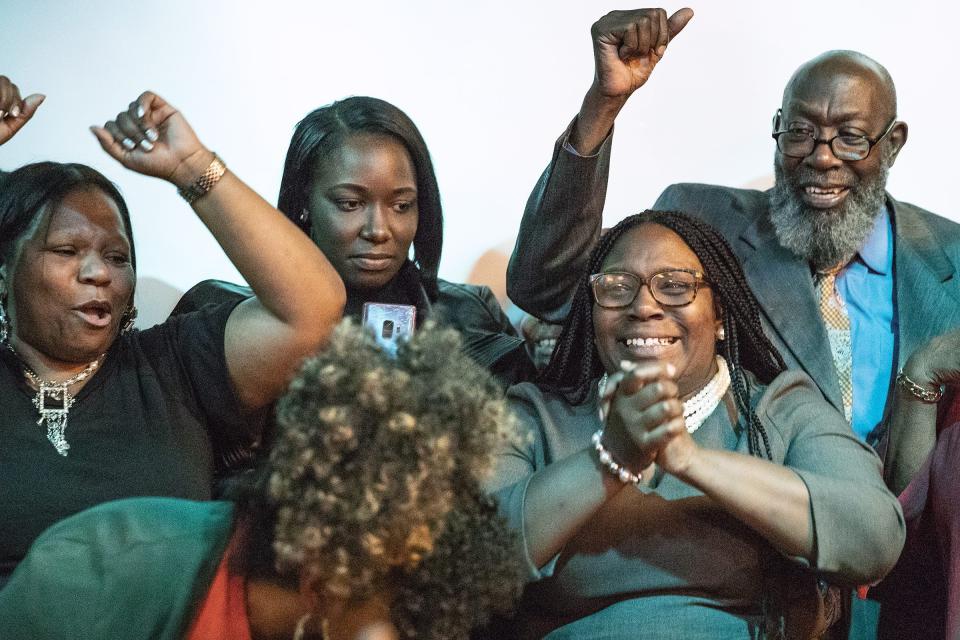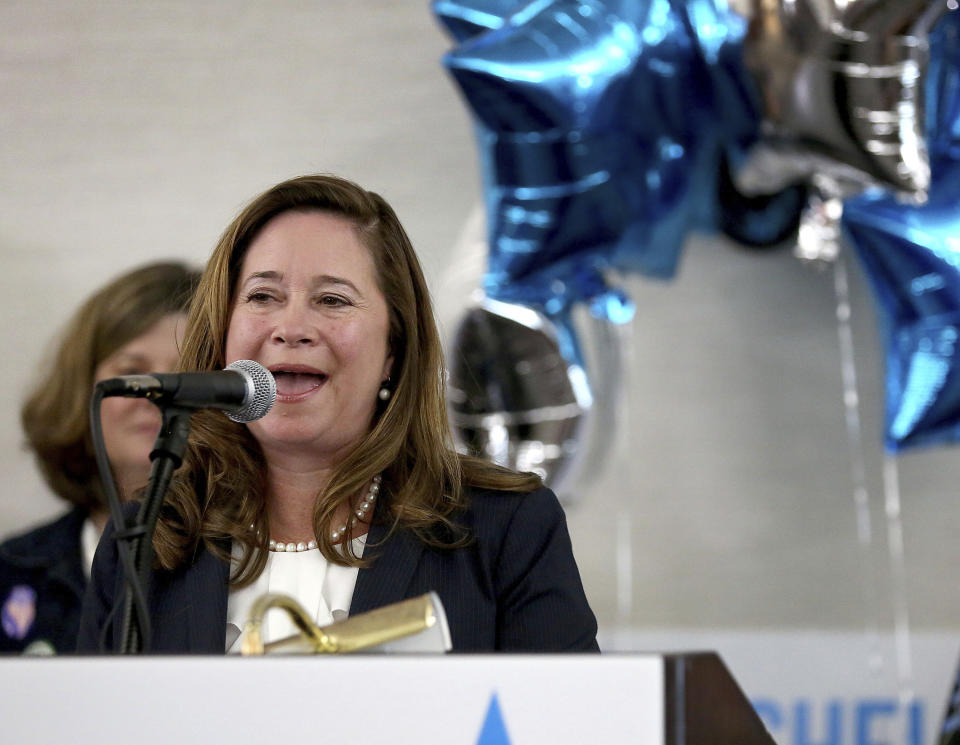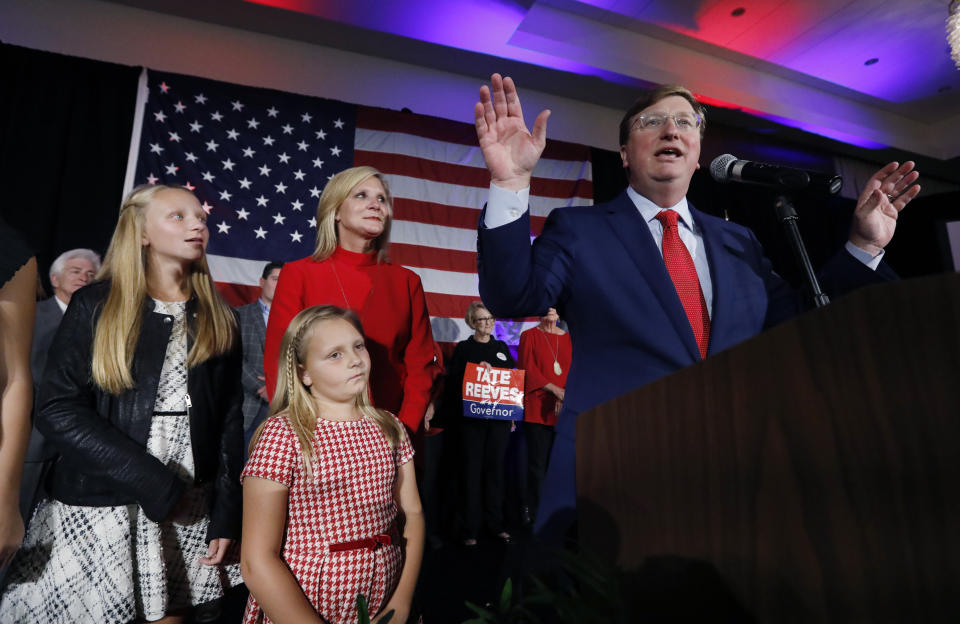Suburbs swing hard to Democrats in state contests

Welcome to 2020 Vision, the Yahoo News column covering the presidential race with one key takeaway every weekday and a wrap-up each weekend. Reminder: There are 89 days until the Iowa caucuses and 363 days until the 2020 election.

After Tuesday’s elections in Kentucky, Mississippi, Virginia and Pennsylvania, President Trump took to Twitter to spin the results — and take his usual share of credit.
“Won 5 out of 6 elections in Kentucky, including 5 great candidates that I spoke for and introduced last night,” Trump crowed. “@MattBevin picked up at least 15 points in last days, but perhaps not enough (Fake News will blame Trump!).”
And then, 14 minutes later: “Congratulations to @tatereeves on winning Governor of the Great State of Mississippi. Our big Rally on Friday night moved the numbers from a tie to a big WIN.”
Trump was right that Republicans won a majority of the races in Kentucky and retained the governorship of Mississippi. But a more objective reading is that winning in Kentucky and Mississippi isn’t exactly something to brag about, given that three years ago Trump won the former by 30 points and the latter by 18.
Taken as a whole, Tuesday’s elections actually suggest danger ahead for Trump and his party in 2020. Here are some of the most interesting results — and what they mean going forward.

Kentucky
As the president noted, Republicans won five of Tuesday’s statewide races. But that sixth contest — the one where they fell short — was the top prize: the governorship.
As of Wednesday morning, Democrat Andy Beshear was claiming victory with a margin of about 5,000 votes over Republican Gov. Matt Bevin, who had yet to concede. Reports suggest Bevin might seek a recount.
The Republican talking point is that the hotheaded Bevin lost because his program of rolling back Medicaid expansion and his attacks on the state’s teachers made him uniquely unpopular. There’s some truth to that; polls showed Bevin was one of America’s least-popular governors, with a 53 percent disapproval rating and a mere 34 percent approval rating in the state. Trump, in contrast, enjoys a 15-point net approval rating there (56 percent, vs. 41 percent disapproval). There is little reason to believe that Trump is in trouble in Kentucky when he runs for reelection. Bevin tied himself to Trump in his campaign, which culminated in a rally Monday night with the president and Kentucky’s two Republican senators. Beshear ran a cautious campaign that did not bash Trump or harp on the impeachment inquiry.
But the issues he did run on, including his support for Medicaid expansion — a key part of former President Barack Obama’s Affordable Care Act — are part of the broader Democratic agenda that will be in play in a number of key state races next year.
And that brings up another Kentucky Republican: Senate Majority Leader Mitch McConnell.
McConnell is America’s most unpopular senator: according to Morning Consult, a full 50 percent of his constituents disapprove of him personally, compared with only 37 percent who approve. A new Public Policy Poll poll found that his performance in office is even more unpopular than his personality: 18 percent of Kentucky voters approve while a whopping 74 percent disapprove. In the same poll, only 37 percent said they would vote to reelect McConnell; 44 percent said they’d support a Democratic opponent instead.
In other words, McConnell is a Bevin-like figure. Tuesday’s outcome suggests that if Democrats nominate a Beshear-like challenger — a moderate who distances him- or herself from the national party — they have a shot at unseating him. Amy McGrath could be that challenger: a former Marine who became the first woman to fly an F/A-18 fighter in combat; a former independent married to a Republican; a second-time candidate who nearly won a deep-red congressional seat 2018; and a figure with a national profile that enabled her to raise almost $11 million in the third quarter of 2019, or about five times as much as McConnell.
On Tuesday, Beshear ran up the score in Lexington, Louisville and the surrounding suburbs while eating into Bevin’s margins in coal country; he even won Knott County, where Trump won in 2016 with 76 percent of the vote. The question for 2020 is whether someone like McGrath can do the same to McConnell.

Pennsylvania
Remember how Trump won Pennsylvania by 44,000 votes in 2016, one of three surprise victories in the legendary “blue wall” of safe Democratic states that put him over the top in the Electoral College?
The president’s hold on the Keystone State is looking more tenuous after Tuesday night.
There were no marquee statewide races this year in Pennsylvania, but in local contests in Philadelphia, Scranton and suburban Delaware and Chester counties, voters turned against both Republicans and establishment Democrats. The progressive sweep suggests a surge in anti-Trump sentiment that could buoy Dems in 2020.
For the first time since at least the Civil War, Democrats won control of the legislature in Delaware County, southwest of Philadelphia; in fact, they won every seat. They also secured their first-ever majority on the board of commissioners in Chester County, the next county west and the only suburban Philadelphia county where Republicans still outnumber Democrats. In Bucks County, an affluent northern suburb, Democrats captured the Board of Commissioners for the first time since 1983. In Philadelphia itself, Working Families Party nominee Kendra Brooks became the first candidate from outside the two major parties to win a City Council seat in more than a century. She was endorsed by Elizabeth Warren. In Scranton, progressive independent Paige Cognetti, who declined to seek the Democratic nomination because she said she didn’t trust the party, was elected mayor. Her slogan: “Paige Against the Machine.”
At first glance, such victories might seem like small ball. But a big part of the reason Hillary Clinton lost Pennsylvania in 2016 is that her margins in Philadelphia, Delaware and Bucks counties were smaller than Obama’s four years earlier, hinting at a lack of Democratic enthusiasm. Tuesday’s results suggest that Trump backlash may help the 2020 Democratic nominee avoid a similar fate.

Virginia
After a strong effort two years ago, Democrats in Virginia came into 2019 a few seats away from flipping both the state House and the state Senate, with one race ending up a tie that was resolved (for the Republican) by drawing a name from a bowl. On Tuesday night, Democrats won a majority in both houses and earned their first trifecta — control of both legislative chambers along with the governor’s mansion — in the commonwealth since 1993. One of the Republican seats to flip went to Shelly Simonds, the Democratic candidate who lost two years ago via the random draw.
While polling predicted this outcome, it came after a tumultuous year in state politics. In January, Democrats received good news: A federal judge ruled that the current House of Delegates maps were a partisan GOP gerrymander, calling for new ones that shifted a half dozen districts blue. But in February, Democratic leaders in the state were hit with a rash of negative headlines over a one-week period: reports that Gov. Ralph Northam and Attorney General Mark Herring had (years before) dressed in blackface, and Lt. Gov. Justin Fairfax was accused of sexual assault, which he has denied. All three men stayed in office — they were not up for reelection this year — and Northam’s popularity has crept back up.
Democrats received a boost from Michael Bloomberg’s gun safety group Everytown, which spent $2.5 million in the state, far outpacing the National Rifle Association’s expenditure of $300,000. Gun policy was the top issue for voters in the state, where a mass shooting in Virginia Beach in May left 12 dead. The suburbs were again a nightmare for Republicans. A loss by Delegate Tim Hugo wiped out the last GOP representative in northern Virginia at both the state and federal levels.
As a result, Republicans will lose their ability to draw district maps after the 2020 census. Democrats may not have a free hand either: State lawmakers began the process of approving a constitutional amendment earlier this year that would put map drawing to a panel made up of eight lawmakers and eight citizens selected by retired circuit court judges. If both houses pass the amendment again, it will go onto the 2020 ballot, where it will need to be approved by voters. Either way, the process will be out of the control of the GOP, which has aggressively gerrymandered the district maps in years past. Democrats have also pledged to work on legislation on gun safety, LGBT protections and expanding voters’ rights.
While Trump held rallies in Kentucky and Mississippi, Democratic presidential candidates have been paying more attention to Virginia. Sen. Elizabeth Warren held a town hall in Norfolk last month, and on Sunday former Vice President Joe Biden attended a rally in Sterling. The next day Sen. Bernie Sanders campaigned with Delegate Lee Carter, a freshman democratic socialist who retained his seat by 6 points. Virginia is a Super Tuesday state in the Democratic primary, so any organizing the contenders do now could potentially pay dividends come March. While Trump generally avoided the state, Vice President Mike Pence campaigned in Virginia Beach over the weekend.
Trump did one endorsement for a state legislature candidate in Virginia: Geary Higgins, running for a seat vacated by a Republican retirement.
“Great Republican Geary Higgins has my complete and total Endorsement for Virginia Senate, 13th District,” said Trump via Twitter on Sunday. “He is strong on Crime, the Border, our Military, Cutting Taxes, and protecting your 2nd Amendment. Dem John Bell will take your guns & raise your taxes. Vote for Geary Higgins.”
Higgins lost to Democrat John Bell by 10 points.

Mississippi
While Republicans appear to have lost the governor’s mansion in Kentucky, they held on in Mississippi, where Tate Reeves won the race to replace retiring Gov. Phil Bryant by 6 points. Reeves was Bryant’s lieutenant governor and outspent opponent Jim Hood, the longtime state attorney general, by a margin of 2 to 1. Reeves worked to tie his opponent to national Democrats, tweeting Tuesday morning, “Hillary Clinton just sent out a tweet encouraging her fans in Mississippi to get out and vote! Jim Hood endorsed her and now she’s returning the favor! First Barack Obama’s endorsement last night and now Hillary is helping. The national Democrats desperately want him to win!” As he did with Bevin, Trump visited Mississippi to campaign for Reeves, although he seldom mentioned the candidate during his speech last Friday.
There is one more gubernatorial election in the South yet to be decided: On Nov. 16, Louisianians will vote in a runoff election between Democratic incumbent John Bel Edwards and Republican Eddie Rispone.
One warning sign for Democrats on another otherwise encouraging night: turnout in Mississippi barely increased from 2015’s uncompetitive gubernatorial contest, and turnout among African-American voters in particular failed to meet the party’s expectations. Democrats have little chance of defeating Trump in the Magnolia State next year. But to win elsewhere, they need to inspire black voters to show up at the polls.

Thumbnail photo: John Sommers II/Getty Images
_____
Download the Yahoo News app to customize your experience.
Read more from Yahoo News:
